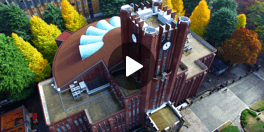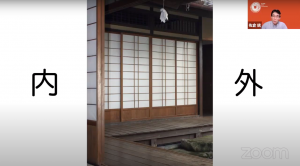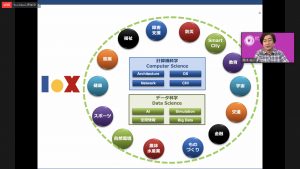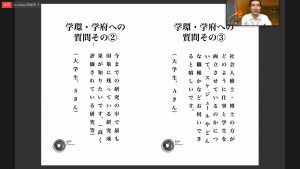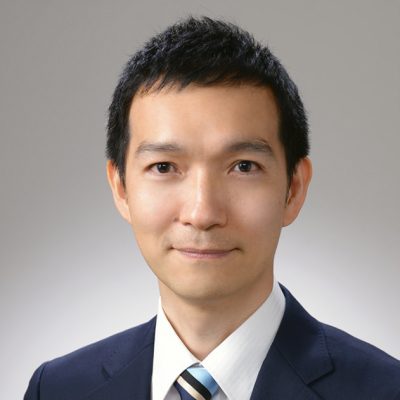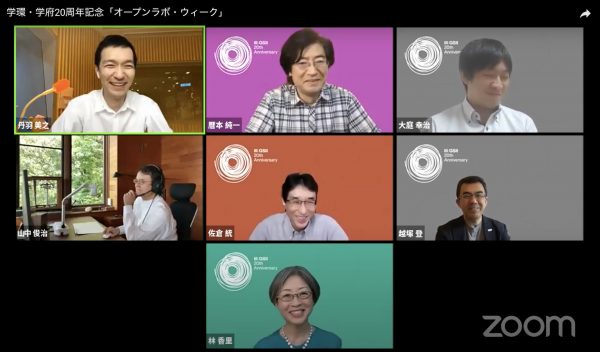
July 14, 2020
学環・学府20周年記念「オープンラボ・ウィーク」キックオフ・イベント開催報告III/GSII 20th Anniversary “Open Lab Week” Kick-off Event
今年、大学院情報学環・学際情報学府は誕生20周年になります。それと関連する様々なイベントの中の一つ、「オープンラボ・ウィーク」(2020年6月20日(土)~27日(土))のスタートを切るキックオフ・イベントが6月20日の午後、ウェビナーの形式でオンラインにて開かれました。学府への入学を検討している受験生をはじめ、最大時で233人(ユニーク視聴者数)が参加しました。
これまでの20年、これからの20年
先ずは越塚登学環長からのあいさつがありました。学環・学府が作られた頃の世界中に起きていた情報環境の急速な変化とそれに関わる東京大学の問題意識を触れながら、時代と共に生まれ、歩んできた学環・学府の意義に関して話しました。それを踏まえて、これからの20年に向けて新たなヴィジョンを打ち出していきたいと述べました。
各コースの紹介
続いて、各コース長によるコースの紹介がありました。学環・学府には、社会情報学コース、文化・人間情報学コース、先端表現情報学コース、総合分析情報学コース、アジア情報社会コース(ITASIA)、生物統計情報学コースの6つのコースがあります。
まず丹羽美之先生が「社情コース」について、「情報化と共に複雑化していく社会をどう理解していくかを様々な観点から研究するコース」と紹介しました。佐倉統先生は「文人コース」を「知のジャングル」と描写し、文/理の壁に対する問題意識と「縁側」のような中と外を結ぶ領域の重要性について話しました。「先端コース」の山中俊治先生は、学環・学府の20周年を象徴するスパイラルのイメージを直接手書きで実演しながら、テクノロジーとアートを結ぶ本コースを言葉通り「表現」してくれました。「分析コース」の暦本純一先生は、近年のIT分野の変革に言及しながら、現在の様々な課題を解決するためには、研究が学際的になることは必然的だと強調しました。ITASIAの林香里先生は、グローバル・アカデミックスタンダードの下で学習できる本コースの長所と「多様性が学問を向上させる」という本コースの意義について英語でスピーチしました。最後に最も若いコース「生物コース」の大庭幸治先生は、生命科学分野の統計専門家を養成する本コースの旨を紹介し、卒業生の就職先といった具体的な情報にも触れました。
ミニトーク・Q&Aセッション
残りの時間は、事前に届いた質問に答えるトークセッションでした。「今までの研究の中で最も印象に残っている研究成果」「社会人学生は仕事と学業は両立できるか」「英語の論文執筆など、国際活動を支援するか」などの質問が寄せました。これらの質問をもとに話は広がり、自然と様々な情報が交わりました。「今後、学環学府にどのようになってほしいですか」という最後の質問について、「教員の中にも多様性の拡大が必要」(林先生)、「『とんでもないやつら』を全力サポートしたい」(暦本先生)「若い人の力が大事…学生主導の場所にしたい」(佐倉先生)「バウハウスのように歴史に残る学校」(山中先生)などなど、多彩でありながらも共通的な指摘とヴィジョンが寄せられました。
丹羽先生からのコメント
最後に、このイベントのとりまとめを担当した丹羽先生のコメントを紹介します。
「学環・学府20周年を記念して行われた初の『オープンラボ・ウィーク』。コロナ禍でやむなくオンライン形式の開催となり、オンラインのイベントをオンラインの会議で準備するという実にややこしい状況に追い込まれましたが、蓋を開けてみれば大盛況。結果的に、お祭り好きで、新しいもの好きの学環・学府らしいイベントになりました。20周年をお祝いするイベントは、まだまだ続きます。今後もご期待ください!」
記事:鈴木麻記(特任研究員)、安ウンビョル(博士課程)
英文翻訳:デイビッド・ビュースト(特任専門員)
This year, the III/GSII is celebrating the twentieth anniversary of its founding. As part of a series organized to mark this occasion, a Kick-off Event was held on the afternoon of June 20th. This online webinar also inaugurated “Open Lab Week”, held from June 20th to 27th. The contents were received by up to 233 people, many of whom were prospective applicants to the GSII’s degree programs.
The Last 20 Years and the Next 20 Years
In his opening address, Dean Koshizuka spoke about the history and significance of the III and GSII, specifically their foundation in response to the already rapidly developing information environment twenty years ago and their adaptation to the ongoing changes since then. He then outlined his vision for the institutions’ next 20 years.
Introduction to the Programs
The event continued with introductions by the directors of each of the GSII’s degree programs. There are currently six such programs: Socio-information and Communication Studies (SCS); Cultural and Human Information Studies (CHIS); Emerging Design and Informatics (EDI); Applied Computer Science (ACS); Information, Technology, and Society in Asia (ITASIA); and Biostatistics and Bioinformatics (BB).
Professor Niwa introduced SCS as a program that seeks to “understand an increasingly complex information society from diverse perspectives”. Professor Sakura described CHIS as “an intellectual jungle” emphasizing the problematization of disciplinary boundaries and the integration of “center” and “periphery”. Professor Yamanaka gave a direct demonstration of the EDI Program’s aim to integrate technology and art with the hand-drawing of a spiral image representing the 20-year history of the III/GSII. Speaking for the ACS program, Professor Rekimoto emphasized the importance and inevitability of interdisciplinary research in order to solve contemporary programs in the light of the recent information technology revolution. Speaking in English, Professor Hayashi pointed out the ITASIA Program’s strengths as a place for learning in accordance with global academic standards while promoting “diversity elevates academic”. Representing the GSII’s most recently established program, Professor Oba introduced the BB Program as a place for the training of specialists in the new field of biostatistics, providing details about the career paths of the program’s graduates.
Minitalk and Q&A Session
In the final part of the event, the speakers answered questions from the online audience. Examples of the questions received are the following: “What is your most memorable research achievement?” “Is it possible to combine study and work?” “Is there support for international activities, such as writing theses in English?” and “How do you want the III/GSII to develop in the future?” In response to this last question, even though each speaker gave his or her own unique response, aspects of a common vision did emerge. Professor Hayashi spoke of the need to increase diversity, including among the faculty. Professor Rekimoto said that he wanted to see full support for “outlandish people” who break the mold. Professor Sakura stressed the importance of the “power of youth” and hoped that students would take the lead, while Professor Yamanaka invoked the Bauhaus School as an example of the kind of historical legacy to which the III/GSII should aspire.
A Word from Professor Niwa
As the event’s lead organizer, Professor Niwa left the following comment:
“The first ‘Open Lab Week’ – held in the 20th anniversary year of the III/GSII’s founding – was a great success, despite the tumult of the Covid-19 pandemic. The online webinar turned out to be very much true to the image and style of the III/GSII, as an institution devoted to celebrating and exploring the new and exciting. Please look forward to our continuing series of anniversary events.”
Text: Maki Suzuki (Project researcher), Eunbyul Ahn (PhD student)
English translation: David Buist (Project senior specialist)
主担当教員Associated Faculty Members
教授
丹羽 美之
- 社会情報学コース
Professor
NIWA, Yoshiyuki
- Socio-information and communication studies course
